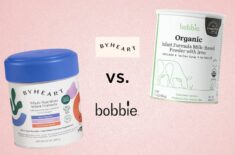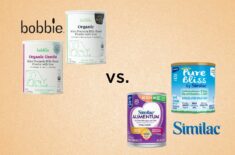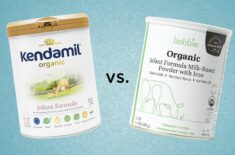Overview
Finding the right formula can be a big challenge to many parents, especially first-timers. Many moms and dads decide to stick to popular formula brands like Similac or Enfamil.
In this review, we’ll compare the main similarities and differences between Similac Pro-Advance and Similac Pro-Sensitive.
What makes these formulas special? Can they both provide complete nutrition for your baby? Which one is the best formula for your little one? Which one has more advantages? Continue reading to find out.
Similarities & Main Differences
Similarities
Similac Pro-Advance and Similac Pro-Sensitive are infant formulas manufactured by Abbott Nutrition. The following are their similarities:
- Both are designed to provide complete nutrition as close to breast milk as possible.
- Both formulas have 2’FL HMO (2’-FL human milk oligosaccharide). It’s a prebiotic found in breastmilk that can help strengthen your baby’s immune system.
- Both have OptiGRO, Similac’s exclusive blend of DHA (docosahexaenoic acid, an omega-3 fatty acid), lutein, and vitamin E. These key ingredients are also found abundantly in breast milk. They can help support your child’s eye health and brain development.
- Both formulas have 1.8 mg iron per 100 calories, almost double the FDA’s minimum requirement of 1 mg per 100 calories. So, your baby might not need additional iron supplementation to help prevent iron deficiency anemia.
- Both are sourced from cows that weren’t given rBST (recombinant bovine somatotropin) or artificial growth hormones. While the harmful effects of rBST remain inconclusive and its use is approved by the FDA, some parents choose to avoid formulas containing this ingredient. (1)
- They’re made from non-GMO ingredients. GMOs (genetically modified organisms) may have harmful effects on the human body and the environment. Consumption of foods with GMOs can lead to antibiotic-resistant diseases and other health hazards. (2)
- Both formulas are free from palm olein oil, a compound commonly used in many formulas. It may inhibit proper calcium absorption. (3)
- Both formulas aren’t suitable for babies with galactosemia. Someone with this condition has difficulty digesting galactose (a smaller component of lactose).
- Both Similac formulas are also available in ready-to-feed liquid bottles.
- Both products are available in different sizes.
- No recalls have been issued for both formulas, though other products in the Similac Advance and Similac Sensitive lines have had recalls for safety issues, possible contamination, or manufacturing defects.
- While Similac Pro-Sensitive is lactose-free, neither formula is dairy-free.
What’s The Difference Between Similac Pro And Similac Advance?
Why Similac Pro-Advance Formula Is Better
- It’s the closest to breast milk among all Similac formulas.
- It doesn’t have corn syrup.
- It has no added sugars.
- These two formulas are similarly priced, but Similac Pro-Advance is slightly cheaper than Similac Pro-Sensitive.
Why Similac Pro-Sensitive Infant Formula Is Better
- It’s lactose-free and may be best suited for babies who are lactose intolerant or have sensitive tummies.
- This formula uses milk protein isolate, a protein source from cow’s milk that’s already separated from components like lactose and fats.
- These two formulas have similar nutritional contents, but Similac Pro-Sensitive has more protein, carbohydrates, calcium, phosphorus, sodium, and potassium concentrations.
Similac Pro-Advance Infant Formula



Best Features & Safety
- It’s the formula that’s closest to breast milk among all the other Similac products.
- It features an exclusive blend of DHA, vitamin E, and lutein called OptiGRO to promote brain and eye development.
- This non-GMO formula can provide immune support for your baby.
- It’s slightly cheaper than Similac Pro-Sensitive.
Age Range
- This product is formulated for babies up to one year old.
Ingredients
- Nonfat milk
- Lactose
- High oleic safflower oil
- Whey protein concentrate
- Soy oil
- Coconut oil
- Crypthecodinium cohnii oil (for DHA)
- Mortierella Alpina oil (for ARA, arachidonic acid)
- 2′-fucosyllactose
- Short-chain fructooligosaccharides
- Lutein
- Nucleotides
- Ferrous sulfate
This formula is free from:
- Artificial growth hormones
- GMOs
- Added sugars
- Corn syrup
Nutritional Facts
Each 5 fl oz preparation of this formula contains the following nutrients:
- Calories: 100 calories
- Total Fats: 5.6 g
- Total Carbohydrates: 10.5 g
- Proteins: 2.07 g
- Vitamin A: 300 IU
- Vitamin B6: 60 mcg
- Vitamin C: 9 mg
- Vitamin D3: 60 IU
- Vitamin E: 1.5 IU
- Vitamin K: 8 mcg
- Iron: 1.8 mg
- Calcium: 78 mg
- Linoleic acid: 1,000 mg
- Thiamin (vitamin B1): 100 mcg
- Riboflavin (vitamin B2): 150 mcg
- Vitamin B12: 0.25 mcg
- Niacin: 1,050 mcg
- Folic acid: 15 mcg
- Pantothenic acid: 450 mcg
- Biotin: 4.4 mcg
- Choline: 24 mg
- Inositol: 24 mg
- Vitamin A: 300 IU
- Phosphorus: 42 mg
- Magnesium: 6 mg
- Zinc: 0.75 mg
- Manganese: 5 mcg
- Copper: 90 mcg
- Iodine: 15 mcg
- Selenium: 2 mcg
- Sodium: 24 mg
- Potassium: 105 mg
- Chloride: 65 mg
Product Recall
- There has been no recall for Similac Pro-Advance, though there have been formula recalls for other products in the Similac Advance line. (4)(5)
Pros & Cons
Pros
- It doesn’t have corn syrup.
- It has no added sugars.
Cons
- It’s not lactose-free.
- It has fewer carbohydrates, proteins, calcium, sodium, phosphorus, and potassium content than Similac Pro-Sensitive.
- It contains vegetable oils.
What Customers Say
Positive Reviews
“I can’t even begin to count all of the formula’s we tried for my 4 month old. Every brand, every type. I was heartbroken to not be able to breastfeed, so finding the perfect formula was so important to me. I started with the organic, which made him spit up. Tried most other brands, which hurt his tummy and caused constipation, which led me to try the sensitive tummy versions, which were also a no go. Then we tried pro advance… and it was literally life changing. No more spit up, happy tummy, and he was finally sleeping. 1000% recommend!” – Reviewer on Similac’s website.
“My daughter did very well with the pro-advanced formula. She is 6 months now and she very rarely (less than 10 times) spit up. Rarely had a hard time sleeping from gas in the first 3 months.” – Reviewer on Similac’s website.
“With twin babies we went through a couple different formulas trying to find one that would work well for both of them (vs having to do two different kinds of formula). We had one baby who had bad reflux and was always spitting up and crying like he was uncomfortable. Our other baby would cry and always had gas issues.. finally we gave this one a try and I’m so glad we did! Both babies started acting so much better gas/fussiness wise and very little spit up issues since starting! After reading a bit into formulas this one isn’t horrible either with its ingredients and added probiotics (we still give another probiotic on top of whatever is in this formula) So far this keeps my now 6mo old babies healthy and happy, so we are sticking with it even though it’s a bit more spendy (especially with twins), I think the ease on my babies tummies is worth it!” – Reviewer on Target.
Negative Reviews
“I’m a first time mom and was not making enough milk in the beginning. I opted for this because it’s advertised as the closest formula to breastmilk. I bought a can and it was fine but on our second can our baby started getting fussy and crying for long periods of time, she hardly slept. Our baby threw up constantly and had a lot of gas. She had all symptoms of reflux, after a couple sleepless nights my milk came in and I decided to exclusively breast feed. It was a huge difference, she slept more and was no longer throwing up gas went away too. Then all of a sudden I ran out of milk (My supply went down) and I decided since all I had was the can of formula I’d try again. Symptoms came back same day of feeding and she was very fussy I felt like a terrible mom. I would love to give Similac another chance but I would hate to spend another 35 dollars on a can we won’t use.” – Reviewer on Similac’s website.
“My son was in the NICU for the first two weeks of his life. He was given Similac Pro Advance, but the ready made formula. Despite having a serious infection, my baby gained a full pound the first week of his life and has never looked back, lol. I bought the powder version to go home with. Over the span of 8 months, I have tried different formulas but always come back to Similac and now will just stick with it until he is off formula. 0-4 months he seemed to spit up a lot so I tried different formulas, including the spit up formula by Similac and the sensitive formula; I didn’t notice a difference though with the sensitive formula he seemed to spit up a bit more. I think it was just his age because he has seemed to grow out of the excessive spit up.” – Reviewer on Amazon.
“A couple months ago, I had my baby try it and she was extremely fussy and would not drink it. She would throw it all back up and cry. I ended up throwing that can away. I gave another can to my parents and my dad thought it would be okay for him to try it. That night he had the runs. A couple months later, fast forward this past weekend, I reintroduced her to this formula with the 3rd can and she had diarrhea 4 times on Saturday, 8 times on Sunday and once this morning (Monday).” – Reviewer on Similac’s website.
Similac Pro-Sensitive Infant Formula


What Is Similac Pro-Sensitive Used For?
- It’s specially formulated for lactose sensitivity and intolerance.
- It also has the prebiotic 2’-FL HMO, which is an immune-nourishing component of breast milk.
- It’s non-GMO certified.
- It also has OptiGRO (Similac’s exclusive blend of DHA, lutein, and vitamin E) to support your baby’s eye health and brain development.
- It also has nucleotides for better metabolic functions.
- This blend also has ARA, an omega-6 fatty acid that can help develop your baby’s immune system, skeletal muscles, and nervous system.
Age Range
- This sensitive formula is made for babies from zero up to 12 months old.
Ingredients
This formula has the following ingredients:
- Corn syrup
- Milk protein isolate
- 2′-fucosyllactose
- High oleic safflower oil
- Sugar
- Soy oil
- Coconut oil
- Crypthecodinium cohnii oil (for DHA)
- Mortierella Alpina oil (for ARA)
- Short-chain fructooligosaccharides
- Lutein
- Nucleotides
- Ferrous sulfate
This formula is free from:
- Artificial growth hormones
- Lactose
- GMOs
Nutritional Values
Each 5 fl oz preparation of this formula contains the following nutrients:
- Calories: 100 calories
- Total Fats: 5.4 g
- Total Carbohydrates: 10.9 g
- Proteins: 2.1 g
- Vitamin A: 300 IU
- Vitamin B6: 60 mcg
- Vitamin C: 9 mg
- Vitamin D3: 60 IU
- Vitamin E: 1.5 IU
- Vitamin K: 8 mcg
- Iron: 1.8 mg
- Calcium: 84 mg
- Linoleic acid: 1,000 mg
- Thiamin (vitamin B1): 100 mcg
- Riboflavin (vitamin B2): 150 mcg
- Vitamin B12: 0.25 mcg
- Niacin: 1,050 mcg
- Folic acid: 15 mcg
- Pantothenic acid: 450 mcg
- Biotin: 4.4 mcg
- Choline: 24 mg
- Inositol: 24 mg
- Vitamin A: 300 IU
- Phosphorus: 56 mg
- Magnesium: 6 mg
- Zinc: 0.75 mg
- Manganese: 5 mcg
- Copper: 90 mcg
- Iodine: 15 mcg
- Selenium: 2 mcg
- Sodium: 30 mg
- Potassium: 107 mg
- Chloride: 65 mg
Product Recall
There has been no recall for Similac Pro-Sensitive Infant Formula. But several formulas from Similac’s Sensitive line were included in the Similac recall in 2010 involving nearly 5 million containers. (6)(7)
Pros
- It doesn’t have palm olein oil, a component in formulas that can affect calcium absorption. (3)
- It’s lactose-free and may be suitable for babies with sensitive tummies.
- It uses milk protein isolate, a protein sourced from cow’s milk.
- The two formulas have similar nutritional values, but Similac Pro-Sensitive has more calcium, proteins, carbohydrates, phosphorus, sodium, and potassium.
Cons
- It’s not organic.
- It has corn syrup.
- It contains added sugars.
- It may cause constipation in some babies.
- It contains vegetable oils.
What Customers Say
Positive Reviews
“I was in the hospital ICU for a week after giving birth to my son and couldn’t breastfeed my baby. I was told that this is the closest milk to breast milk. My son loved it. He doesn’t throw up alot or get the runs from the milk. It doesn’t clump up in the bottom of the bottle either. He digests the milk good and I love the fact that it isn’t too expensive. My pediatrician approved the milk.” – Reviewer on Walmart.
“My daughter started having stomach issues and was getting really fussy and crying all the time. I have a sensitive stomach so I decided to try this formula to see if it helped at all and after the first bottle, I noticed a change. We’re now on bottle #4 of this stuff and she is like a whole new baby. She no longer looks in pain after or during eating and she is actually staying awake and playing more.” – Reviewer on Walmart.
“Similac Pro-sensitive infant formula has been a lifesaver for my son and our family’s sanity. My son struggled with gas and digestion when he was born. We tried out different formulas but nothing has relieved his gas as well. He is able to pass gas more comfortably and is not as fussy. We all get more sleep and rest now. I would highly recommend this formula if your baby is struggling with gas and fussiness.” – Reviewer on Walmart.
Negative Reviews
“I’ve been trying to find the right formula for my 3 month old after I stopped breastfeeding. This particular similar formula has been awful for my baby. It gave her more gas, made her so fussy, and the poor thing could not sleep well EVER. She kept curling up her stomach in pain after being fed this formula. We did as recommended and tried it for 3 days to see if the issues would pass, but the issues remained. We are upset we spent money on this formula! We have been up every night trying to comfort our baby after this formula nightmare. Needless to say we stopped using it and found something better.” – Reviewer on Similac’s website.
“Just FYI, the formula has recently been changed. I spoke with similac since my baby has started spitting up and vomiting bottles from the can i bought with the blue scoop. The cans with the blue scoop are the new version of the formula. We are faithful customers of similac pro sensitive for 6 months, but my baby is not tolerating the new changes to the similac pro sensitive formula. We have went from a happy baby to fussy, crying, and doesnt want to be put down.” – Reviewer on Walmart.
“Tried this for one week. The formula was definitely NOT for my baby. This made my baby even MORE gassy and fussy. She passed gas all the time, multiple times in an hour (imagine farting every 3 minutes or so), and the smell was absolutely terrible… like an adult’s! She would cry during feedings and didn’t sleep well. Also, it made her slightly constipated… and when she did poop, it smelled terrible too! Very disappointed, since formulas are expensive and I bought a large container but I can’t use it.” – Reviewer on Similac’s website.
Summary & Recommendation
Finding the right formula can be a big challenge, especially because there are many similar options available.
But the right formula may provide most of your baby’s needs, can meet your budget, and has the features or nutritional content that you might want to give your child.
Both Similac Pro-Advance and Pro-Sensitive can provide your baby with complete nutrition, immune support, and nutrients for brain development.
Here are our recommendations to help you pick which one to give your baby:
Choose Similac Pro-Advance Formula if:
- You prefer a formula that’s closest to breast milk.
- You prefer a formula that doesn’t have corn syrup and added sugars.
- You want to buy a formula that offers better value for your money (Similac Pro-Advance is slightly cheaper).
Choose Similac Pro-Sensitive Infant Formula if:
- You need or want to provide a lactose-free formula for your baby.
- You’re looking for a formula that may be better suited for sensitive tummies.
- You prefer a formula with milk protein isolate.
- You want a formula with better nutritional values, especially one with more calcium, proteins, carbohydrates, phosphorus, and potassium.
There are dozens of different infant formulas from various brands created for your baby’s first year or formulated for older kids. You can find organic formulas, regular ones, and specially formulated options. The following are other formulas that you can choose for your little one.
Ready-To-Feed Liquid Formulas: Similac Pro-Advance Vs. Pro-Sensitive
- Both these formulas are available in ready-to-feed liquid formulas.
- Both these liquid formulations have similar content to their powder counterparts.
Similac Pro-Advance Vs Similac Advance
Similac Pro-Advance

Similac Pro-Sensitive

- These two formulas have nearly identical contents and nutritional values.
- Both have no palm olein oil, added sugars, or corn syrup.
- They both have OptiGRO.
What Makes Similac Pro-Advance Better:
- It has the prebiotic 2’-FL HMO.
- They both have the same nutrient content, except for inositol. Similac Pro-Advance has more inositol (24 mg) than Similac Advance (4.7 mg). Inositol can help control blood sugar and is important for your baby’s growth and development.
What Makes Similac Advance Better:
- Similac Advance is slightly cheaper than Similac Pro-Advance.
What’s The Difference Between Sensitive And Pro-Sensitive Similac?
- Both formulas also have similar formulations and contents.
- Both are made for gas and fussiness due to lactose sensitivity.
- They also have OptiGRO.
Similac Pro-Sensitive Infant Formula


Similac Sensitive Infant Formula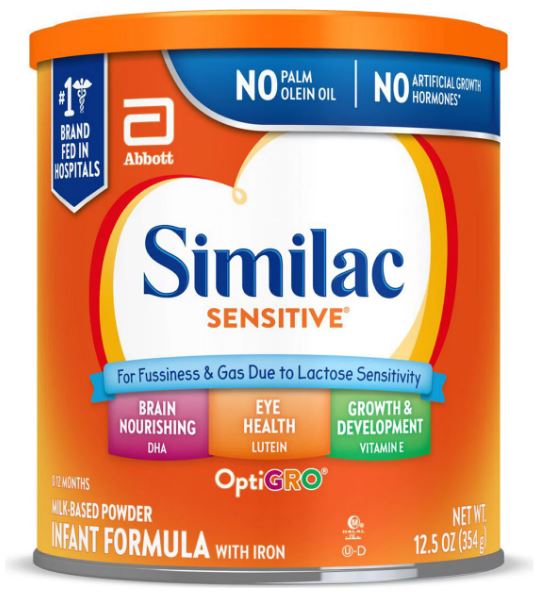



What Makes Similac Pro-Sensitive Better:
- It contains the prebiotic 2’-FL HMO.
- They both have the same nutrient content (vitamins and minerals), except for inositol: Similac Pro-Sensitive has more (24 mg) than Similac Sensitive formula (4.3 mg).
What Makes Similac Sensitive Better:
- Similac Sensitive formula is slightly cheaper than Similac Pro-Sensitive.
Similac Pro-Advance Vs Similac Sensitive
Similac Pro-Advance Infant Formula



Similac Sensitive Infant Formula



- These two formulas have similar contents and nutritional values.
- Both have no palm olein oil.
- Both have OptiGRO.
What Makes Similac Pro-Advance Better:
- It has the prebiotic 2’-FL HMO.
- It has no added sugars and no corn syrup.
- It has more inositol (4.7 mg) than Similac Sensitive (4.3 mg).
What Makes Similac Sensitive Better:
- It’s a gentle formula that may be a better choice for babies with sensitive tummies or lactose intolerance.
- Similac Sensitive is cheaper than Similac Pro-Advance.
Similac Pro-Sensitive Vs Similac Advance
Similac Pro-Sensitive Infant Formula


Similac Advance Infant Formula



- These two formulas have similar contents.
- They also have OptiGRO.
- They have no palm olein oil or artificial growth hormones.
What Makes Similac Pro-Sensitive Better:
- It’s formulated for gas and fussiness because of lactose sensitivity.
- It contains the 2’-FL HMO, a prebiotic.
- It’s made from non-GMO ingredients.
- These two formulas have similar nutritional contents, but Similac Pro-Sensitive has more inositol, calcium, phosphorus, proteins, carbohydrates, sodium, and potassium.
What Makes Similac Advance Better:
- It doesn’t have added sugars and no corn syrup.
- Similac Advance is slightly cheaper than Similac Pro-Sensitive.
Similac Advance Vs Similac Sensitive
Similac Advance Infant Formula



Similac Sensitive Infant Formula



- Both formulas have similar components, including OptiGRO.
Why Similac Advance Formula Is Better
- It doesn’t have corn syrup.
- It has no added sugars.
- It has more inositol and fat content than Similac Sensitive.
- These two formulas are similarly priced, but Similac Advance is slightly cheaper than Similac Sensitive.
Why Similac Sensitive Infant Formula Is Better
- It’s lactose-free and can be suitable for babies with lactose intolerance or sensitive tummies.
- It uses a milk protein isolate from cow’s milk.
- These two formulas have similar nutritional values, but Similac Sensitive has more proteins, potassium, carbohydrates, calcium, and phosphorus.
Similac Pro-Advance Vs Similac Pro-Total Comfort
Similac Pro-Advance Infant Formula



Similac Pro-Total Comfort Infant Formula



- These two formulas have similar components, including OptiGRO and the prebiotic 2’-FL HMO.
- They don’t have artificial growth hormones or palm olein oil.
Why Similac Pro-Advance Formula Is Better
- It’s Similac’s closest formula to breast milk.
- It doesn’t have corn maltodextrin or added sugars.
- Similac Pro-Advance is slightly cheaper than Similac Pro-Total Comfort.
Why Similac Pro-Total Comfort Infant Formula Is Better
- This formula uses partially hydrolyzed whey proteins which have been broken down for easy digestion.
- It may be an ideal choice if your baby has a sensitive stomach.
- These two formulas have similar nutritional contents, but Similac Pro-Total Comfort has more proteins, carbohydrates, inositol, calcium, phosphorus, potassium, and sodium.
- It has the highest calcium content (105 mg) than the other Similac formulas mentioned above (Sensitive and Pro-Sensitive have 84 mg; Advance and Pro-Advance have 78 mg).
Similac Pro-Sensitive Vs Similac Pro-Total Comfort
Similac Pro-Sensitive Infant Formula


Similac Pro-Total Comfort Infant Formula



- These two formulas have similar components, including the prebiotic 2’-FL HMO and OptiGRO.
- They don’t have palm olein oil, artificial growth hormones, or GMOs.
- These two have the same price.
Why Similac Pro-Sensitive Formula Is Better
- It’s lactose-free and may help with gas and fussiness.
- It’s Similac’s first formula with the immune-nourishing prebiotic 2’-FL HMO.
Why Similac Pro-Total Comfort Infant Formula Is Better
- It has partially hydrolyzed whey proteins for easy digestion.
- This gentle formula may be suitable for babies with sensitive stomachs.
- Both formulas have similar nutritional contents, but Similac Pro-Total Comfort has more calcium, phosphorus, potassium, sodium, proteins, and carbohydrates.
Similac Pro-Advance Vs. Enfamil Neuropro Gentlease
Similac Pro-Advance Infant Formula



Enfamil NeuroPro Gentlease Infant Formula




- These two formulas have similar nutritional content and may provide complete nutrition for your baby.
- They’re both milk-based formulas with non-GMO ingredients and no artificial growth hormones.
- They have no added sugars.
They have the same content/concentration for the following nutrients:
- Vitamin B6
- Choline
- Inositol
- Vitamin A
- Vitamin D
- Iron
- Iodine
What Makes Similac Pro-Advance Better:
- It contains prebiotics (2’-FL HMO).
- It doesn’t have corn syrup.
- Similac Pro-Advance costs less than the Enfamil Neuropro Gentlease.
It has more of the following nutrients:
- Fats
- Linoleic acid
- Thiamin (vitamin B1)
- Riboflavin (vitamin B2)
- Niacin
- Biotin
- Copper
- Chloride
What Makes Enfamil Neuropro Gentlease Better:
- It contains MFGM (milk fat globule membrane), a compound that can support your baby’s cognitive development.
- According to the company’s website, this formula is clinically proven to reduce crying, fussiness, spit-up, and gas within 24 hours of use.
It contains more of the following nutrients:
- Proteins
- Carbohydrates
- Vitamin E
- Vitamin K
- Vitamin B12
- Folic acid
- Pantothenic acid
- Vitamin C
- Calcium
- Phosphorus
- Magnesium
- Zinc
- Manganese
- Selenium
- Sodium
- Potassium
Similac Pro-Sensitive Vs. Enfamil Neuropro Gentlease
Similac Pro-Sensitive Infant Formula


Enfamil NeuroPro Gentlease Infant Formula



- They can provide complete nutrition for your baby and have similar content.
- These milk-based formulas have non-GMO ingredients and no artificial growth hormones.
They have the same amount of the following nutrients:
- Vitamin B6
- Choline
- Inositol
- Vitamin A
- Vitamin D
- Iron
- Iodine
What Makes Similac Pro-Sensitive Better:
- It has prebiotics (2’-FL HMO).
- Similac Pro-Sensitive Infant Formula costs slightly less than the Enfamil Neuropro Gentlease.
It has more of the following nutrients:
- Carbohydrates
- Fats
- Linoleic acid
- Thiamin (vitamin B1)
- Riboflavin (vitamin B2)
- Niacin
- Biotin
- Calcium
- Phosphorus
- Copper
- Chloride
What Makes Enfamil Neuropro Gentlease Better:
- It has MFGM (milk fat globule membrane), a compound that can support your baby’s cognitive development.
It contains more of the following nutrients:
- Proteins
- Vitamin E
- Vitamin K
- Vitamin B12
- Folic acid
- Pantothenic acid
- Vitamin C
- Magnesium
- Zinc
- Manganese
- Selenium
- Sodium
- Potassium
Similac Pro-Advance Vs. Enfamil Gentlease
Similac Pro-Advance Infant Formula



Enfamil Gentlease Infant Formula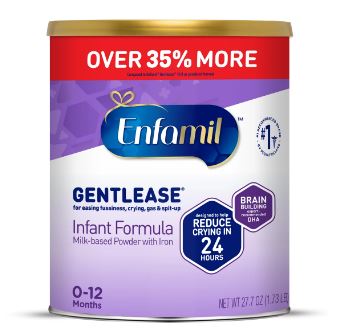



- These two formulas have similar nutritional content and can provide complete nutrition for your baby.
- They’re both milk-based formulas with no artificial growth hormones.
- They both have no added sugars.
They have the same content/concentration for the following nutrients:
- Vitamin B6
- Choline
- Vitamin A
- Vitamin D
- Iron
- Iodine
What Makes Similac Pro-Advance Better:
- It contains prebiotics (2’-FL HMO).
- It doesn’t have corn syrup.
- Similac Pro-Advance costs slightly less than the Enfamil Gentlease.
It has more of the following nutrients:
- Fats
- Linoleic acid
- Thiamin (vitamin B1)
- Riboflavin (vitamin B2)
- Niacin
- Biotin
- Inositol
- Copper
- Chloride
What Makes Enfamil Gentlease Better:
- According to the company’s website, this formula is clinically proven to reduce crying, fussiness, and gas within 24 hours of use.
It contains more of the following nutrients:
- Proteins
- Carbohydrates
- Vitamin E
- Vitamin K
- Vitamin B12
- Folic acid
- Pantothenic acid
- Vitamin C
- Calcium
- Phosphorus
- Magnesium
- Zinc
- Manganese
- Selenium
- Sodium
- Potassium
Is Similac Pro-Sensitive The Same As Enfamil Gentlease?
They can also provide complete nutrition and have similar content.
They have the same amount of the following nutrients:
- Vitamin B6
- Choline
- Vitamin A
- Vitamin D
- Iron
- Iodine
What Makes Similac Pro-Sensitive Better:
- It has prebiotics (2’-FL HMO).
It has more of the following nutrients:
- Carbohydrates
- Fats
- Linoleic acid
- Thiamin (vitamin B1)
- Riboflavin (vitamin B2)
- Niacin
- Biotin
- Inositol
- Calcium
- Phosphorus
- Copper
- Chloride
What Makes Enfamil Gentlease Better:
- It doesn’t have added sugars.
- According to the company’s website, it’s clinically proven to reduce crying, gas, and fussiness within 24 hours of use.
- Enfamil Gentlease costs slightly less than Similac Pro-Sensitive.
It contains more of the following nutrients:
- Proteins
- Vitamin E
- Vitamin K
- Vitamin B12
- Folic acid
- Pantothenic acid
- Vitamin C
- Magnesium
- Zinc
- Manganese
- Selenium
- Sodium
- Potassium
Baby Formula FAQs
What Factors Must I Consider In Picking A Formula?
- Dairy-free
- Lactose-free formulas
- Reduced lactose formulas
- Probiotics and prebiotics
- Hypoallergenic
- Texture and thickness
- It closely resembles breast milk
- Nutrients to support brain development (DHA and ARA)
- Meets FDA requirements for iron and other nutrients
- Safety concerns (no recent safety issues or formula recalls)
Can I Mix Two Different Formulas For My Baby?
Yes, you can mix different formulas. But make sure your baby has no sensitivities to any of their components. Always consult with your pediatrician before mixing or changing formulas.
Is Goat Formula Alright For Babies?
Yes, goat formula may be a safe alternative to cow’s milk for babies. But if your baby is lactose intolerant, you should find a lactose-free option for this dairy milk.
Will Sensitive Formulas Require Special Preparation?
No. Sensitive formulas can be prepared in the same way even if they have different formulations from regular milk products.
Do Organic Formula Matter?
We recommend organic, non-GMO formulas over regular formulas.
Although they are usually more expensive, organic formulas can be safer and healthier than heavily processed commercial products. They’re free from:
- Pesticides
- Herbicides
- Fungicides
- Antibiotics
- Growth hormones
- GMOs
- Other toxic chemicals
Is Corn Syrup Harmful In Baby Formula?
The corn syrup in baby formulas is different from the corn syrup (high-fructose) used in sugary drinks or commercial foods.
Still, some parents prefer to avoid any formula with corn syrup.
What Symptoms Indicate Lactose-Intolerance?
Lactose intolerance may cause great discomfort to your little one, even though it’s rarely life-threatening.
These are some common symptoms that they might have after taking baby food or formula with lactose: (8)
- Fussiness
- Frequent crying
- Vomiting
- Diarrhea or loose stools
- Nausea
- Stomach cramps
- Bloating
- Gas or flatulence
What Symptoms Indicate Cow’s Milk Protein Allergy?
Cow’s milk protein allergy can cause discomfort to your child and is also potentially life-threatening. (9)
Symptoms of a mild allergic reaction: (9)
- Rashes
- Hives
- Itching
- Swelling
Symptoms of a severe allergic reaction: (9)
- Nausea
- Breathing trouble
- Wheezing
- Loss of consciousness
- Possible death (rare, extreme cases)
Around 75% of kids with a cow’s milk allergy may outgrow it. A lot can also tolerate cow’s milk used in baking products. But you have to make sure to consult with your pediatrician before trying this at home. (9)
What Products Should I Avoid For Babies with Cow’s Milk Allergy?
Cow’s milk allergy affects around 2.5% of kids below three years old. Nearly all infants who develop this allergy do so during the first year. (9)
If your child has cow’s milk protein allergies, you can avoid these dairy products and foods: (9)
- Dairy milk in any form (including whole, low-fat, non-fat, condensed, derivative, dry, evaporated, malted, milkfat, powder, solids, protein, and skimmed)
- Any milk from other animal sources, such as goat milk (it closely resembles cow’s milk)
- Butter, butterfat, butter oil, or butter acid
- Buttermilk
- Ghee
- Cheese
- Cottage cheese
- Custard
- Curds
- Half-and-half
- Pudding
- Yogurt
- Sour cream
- Whey in any form
- Whey protein hydrolysate
You must also avoid food products with the following content: (9)
- Casein or caseinates (in all forms)
- Casein hydrolysate
- Lactic acid starter culture
- Lactoglobulin
- Lactalbumin or lactalbumin phosphate
- Lactoferrin
- Milk protein hydrolysate
- Rennet casein
- Tagatose
Note that these foods can also contain milk: (9)
- Certain breakfast foods (waffles, pancakes, cereals, etc.)
- Baked goods or desserts, including cakes and bread
- Chocolate drinks and snacks
- Caramel candies
- Processed foods (such as sausages, luncheon meat, and hot dogs)
- Margarine
- Nougat
- Ice cream
- Specialty beverages (including smoothies, lattes, frappes, etc.)
- Packaged snack items (such as crackers, pretzels, and chips)
Not all of these products have milk proteins. But always check the label of any food or drink if your child has a cow’s milk allergy. (9)
Do Gassy Babies Need Different Formulas?
It’s not always the case. You can try frequent burping during feeds and keeping your baby upright up to 30 minutes after drinking formula. It may help prevent gas build-up in your little one’s tummy.
Anti-colic baby bottles such as Dr. Brown’s Anti-Colic Bottles or Comotomo Baby Bottles might also help.
If your baby remains gassy even with these changes, you can try changing their formula to the following:
- Similac Alimentum
- Enfamil A.R.
- Similac Pro-Sensitive Infant Formula
- Similac Sensitive Infant Formula
- Enfamil Gentlease Infant Formula
- Enfamil NeuroPro Gentlease Baby Formula
- Gerber Good Start Soothe Non-GMO Powder Infant Formula
- Enfamil Nutramigen Hypoallergenic Colic Baby Formula
- Earth’s Best Organic (Reduced Lactose) Sensitivity Infant Powder Formula with Iron
If you’re planning to change your child’s formula, make sure to consult with your pediatrician first.
Do Babies Outgrow Reflux, Fussiness, And Gassiness?
Yes. Many babies usually experience these conditions because of their still-developing tummies. They may outgrow fussiness, gassiness, or infant reflux by the time they are six months old.
Can I Give Water To My Baby In Between Bottles?
No. Don’t give your water in between bottles, especially to babies less than six months old. They have to get all their nutrition, including liquids, from breast milk or formula. (10)
If they’re older than six months, you can give them water but limit intake to around 4-8 ounces per day until they’re one year old. (10)
Older kids (1-3 years old) may drink up to four cups of liquids (including formula, water, juices, or other liquids) per day. (10)
How To Know If My Baby Doesn’t Like A Particular Formula?
Watch out for these signs that your baby doesn’t like a certain formula:
- Refusal to take a bottle
- Turning away from the bottle
- Crying or becoming fussy while drinking
- If hungry, your baby might take the formula but doesn’t finish the bottle
What Signs Indicate That I Need To Try A Different Formula?
These are some signs that your child might need to try a different formula:
- Frequent rejection of a bottle (or doesn’t finish a bottle)
- Crying a lot and becoming fussy even with regular, frequent feedings
- Spitting up a lot
- Some streaks of blood in their stool
A child who becomes lethargic or shows breathing difficulties should be rushed to a medical facility immediately because they might be having a severe allergic reaction to the milk. Such situations can be life-threatening.
Are Ready-Made Infant Formulas Better Than Powder?
Some parents prefer ready-made liquid formulas because they’re more convenient and don’t need to be prepared ahead of time.
But such formulas can be more expensive than the powder form of the same formulation.
Can I Make My Baby’s Formula?
No. The FDA regulates baby foods and discourages anyone from making infant formulas at home because these may lead to serious health concerns. (11)
The FDA regulates commercially available infant formulas but not homemade formulas. However, the government agency reminds parents that safety should be your prime concern when choosing foods and formula for your baby. (11)
Mistakes in combining certain ingredients may lead to unsafe formulas that can actually harm your child. Feeding your child with any untested homemade formula can also cause severe nutritional imbalances. (11)
Can I Feed Pure Cow’s Milk To My Baby?
No. Though baby formula comes from cow’s milk, it’s processed to resemble human breast milk as much as possible. Pure cow’s milk has high levels of potassium and phosphorus that your baby’s kidneys can’t process. (12)
Other Products Or Baby Formulas To Try
You can also try these products for your baby:
- HiPP Dutch Organic Combiotic Infant Milk Formula
- Holle Goat Based Formula
- Gerber Good Start Gentle (HMO) Non-GMO Powder
- Baby’s Only Organic Sensitive DHA/ARA Formula
- Kabrita Goat Milk Toddler Formula Powder
REFERENCES
(1) https://www.cancer.org/cancer/cancer-causes/recombinant-bovine-growth-hormone.html
(2) https://www.ncbi.nlm.nih.gov/pmc/articles/PMC3791249/
(3) https://pubmed.ncbi.nlm.nih.gov/8780336/
(4) https://www.cbsnews.com/htdocs/pdf/SimilacLotList.pdf
(5) https://www.aappublications.org/content/27/9/2006229
(6) https://buffalonews.com/news/similac-recalls-powdered-formula/article_a7d6e134-56bc-56c7-b29d-11edd4093b1e.html
(7) https://www.cbsnews.com/htdocs/pdf/SimilacLotList.pdf
(8) https://www.mayoclinic.org/diseases-conditions/lactose-intolerance/symptoms-causes/syc-20374232
(9) https://www.foodallergy.org/living-food-allergies/food-allergy-essentials/common-allergens/milk
(10) https://www.healthychildren.org/English/healthy-living/nutrition/Pages/Choose-Water-for-Healthy-Hydration.aspx
(11) https://www.fda.gov/food/people-risk-foodborne-illness/questions-answers-consumers-concerning-infant-formula#2
(12) https://www.ncbi.nlm.nih.gov/pmc/articles/PMC2791650/



